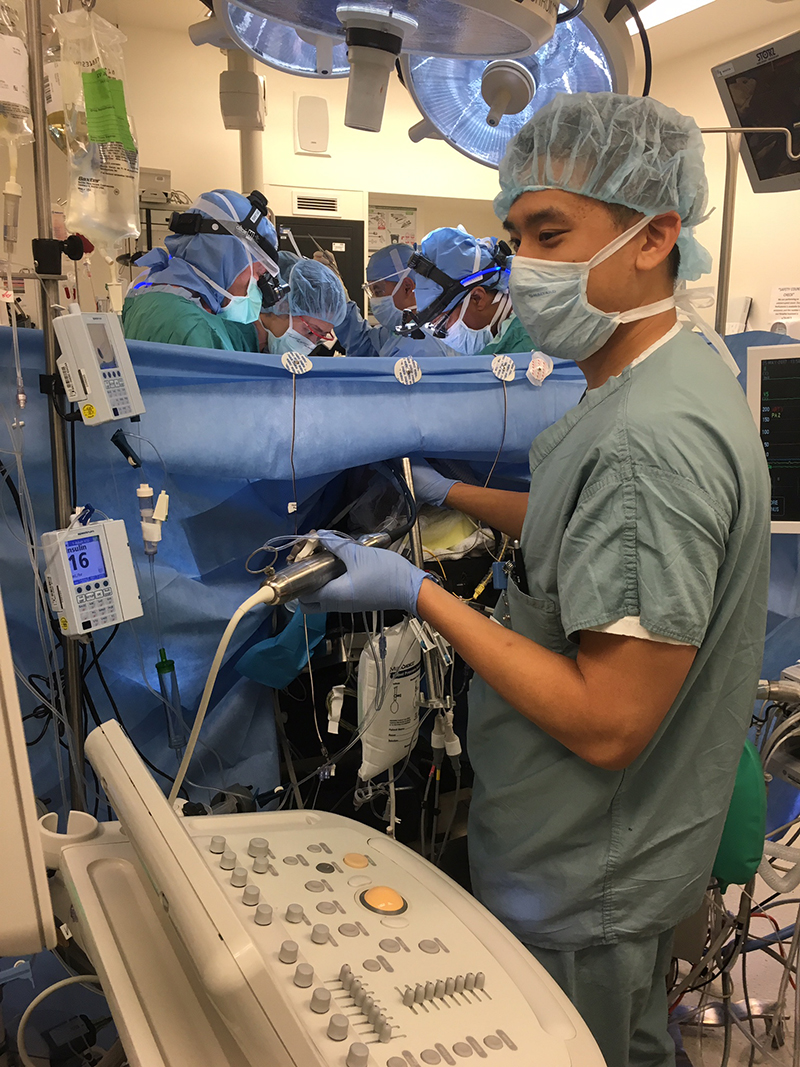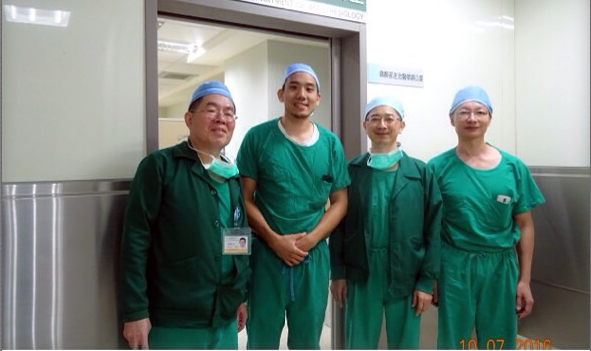You’ve figured out that you want to serve on the front line of medicine as an allopathic physician. Now, you’ll just need to determine your specialty — after all, this is quite a broad field! The Accreditation Council for Graduate Medical Education accredits training programs in 133 specialties and subspecialties, and the American Board of Medical Specialties represents 24 board-certified specialties (with many sub-specialties within each of these major specialties). Having so many options can seem overwhelming, so take your time considering each one that interests you. Let’s start with anesthesiology, the specialty that focuses on administration of anesthetics as well as monitoring its effects on patients before, during and after surgery. Recently, we caught up with Alex Cheng, who is currently completing his cardiothoracic anesthesiology fellowship at UCLA, to discuss what led him down this health care career path.
ExploreHealthCareers.org (EHC): Thanks for your time, Alex. Let’s start broad: What inspired you to enter the health care field?
Alex Cheng (AC): I grew up fascinated with science: In particular, I remember reading books such as Richard Preston’s The Hot Zone (his classic novel on Ebola and other hemorrhagic fevers), which both terrified me and inspired me to learn more about viruses and other diseases.
During high school, I participated in extracurricular activities, including Science Olympiad; events such as “Disease Detective” helped further deepen my interest in the field. Early in college I initially thought that I wanted to be a researcher, but some time in the lab, and also experiences shadowing in the hospital, helped me realize that I enjoyed the interpersonal engagement of being a clinician more deeply than pure bench research, so I turned my attention to medicine.
EHC: What’s your educational background?
AC: I went to public magnet schools for K-12, then went to 4 years of college at Harvard University and 4 years of medical school at the University of Michigan, Ann Arbor before completing 5 years of post-graduate training at UCLA, which included 1 year of internship, 3 years of additional anesthesiology residency, and one year of cardiothoracic anesthesiology fellowship. A lot of time training, for sure!
EHC: What led you to this specialty?
AC: Anesthesiology is an excellent field. As anesthesiologists, we are tasked with making sure patients are comfortable at a time when they can often feel anxious and vulnerable. It is also a fast-paced specialty that requires me to think on my feet. When the patient’s blood pressure or oxygen levels are low in the operating room, I have to diagnose and treat the problem quickly.
At the same time, I get to work with my hands every day: For instance, I place invasive arterial and venous lines, monitor patients’ hearts with echocardiography (ultrasound) and manage laboring patients’ pain with epidurals. Finally, every day I get to work as part of a team, with surgeons, nurses and technicians, as we bring patients safely through surgery and into recovery.
EHC: What is your current title and what do you do?
AC: I am currently finishing up my fellowship in cardiothoracic anesthesiology at UCLA. Next month, I will be starting as an attending anesthesiologist in a private practice in Orange County. I will be performing anesthesia for a mixture of cases, including (but not limited to) cardiac surgery, obstetrics and orthopedic surgery.
As I mentioned before, it took a lot of school to get to this position! Along the way, in addition to the classes, there were more than a few standardized tests (the MCAT, then the medical board exams and the anesthesia board exams…), but ultimately, it takes a combination of hard work, finding some sort of balance in life and — most importantly — being surrounded by supportive family, friends, classmates and co-residents. No one gets through medical training without a ton of help!
EHC: What advice do you have for students interested in going into your field?
AC: My main advice is to take your time and consider a lot of different options, whether you choose to go into medicine or another health care field. If you keep your mind open, you might be surprised by what you find yourself enjoying. To that end, I encourage students to spend time not only learning about different specialties, but also shadowing people in those fields and seeing what their whole lives are like. Then consider if you can honestly see yourself in their shoes one day.
EHC: What do you wish you knew before you entered your field?
AC: As I’m only beginning my career, I feel like I still have so much to learn and experience. Right now, I don’t think there’s anything I wish I had known per se, but if I could give advice to my younger self, or to younger students who are thinking of becoming doctors, I’d say that medicine is a very rewarding field, but it’s a long and sometimes difficult road, so remember to enjoy the journey — otherwise, if you don’t savor the experiences and the patients along the way, it can be easy to lose sight of why you started on the path in the first place.
EHC: Finally, how do you stay up to date on happening in your field? Any sources that you’d suggest for our readers?
AC: Currently, my main sources of info are the American Medical Association (AMA) and the American Society of Anesthesiologists (ASA). I subscribe to their emails and they keep me up to date regarding new studies and policies. I don’t have any particular blogs or magazines that I follow, but I do think that getting in contact with the AMA or ASA can be helpful if you’re interested in exploring a career in medicine.


